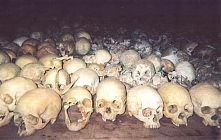Attacks in Sudan’s Darfur region are genocide: US Congress
WASHINGTON, July 23 (AFP) — The US Congress unanimously passed a resolution declaring the atrocities being committed in Darfur, Sudan, a genocide, and calling on the White House to intervene multilaterally or even unilaterally to stop the violence.
 By a vote of 422 to zero, the House of Representatives and “the Senate concurring” passed the resolution introduced a month ago by New Jersey Democrat Donald Payne stressing that in Darfur 30,000 people have been “brutally murdered”, 130,000 have fled to neighboring Chad and more than one million have been internally displaced by the violence.
By a vote of 422 to zero, the House of Representatives and “the Senate concurring” passed the resolution introduced a month ago by New Jersey Democrat Donald Payne stressing that in Darfur 30,000 people have been “brutally murdered”, 130,000 have fled to neighboring Chad and more than one million have been internally displaced by the violence.
Quoting the United Nations Resident Humanitarian Coordinator who said that the violence in the poverty-stricken region “appears to be particularly directed at a specific group based on their ethnic identity and appears to be systemized,” the resolution “declares that the atrocities unfolding in Darfur, Sudan, are genocide.”
It urges the US administration of President George W. Bush to “call the atrocities … by its rightful name: ‘genocide,’ and calls on it to lead an international effort to prevent it.
The resolution, adopted late on Thursday, further calls on the Bush administration “to seriously consider multilateral or even unilateral intervention to prevent genocide should the United Nations Security Council fail to act.”
It also demands “targeted sanctions, including visa bans and the freezing of assets of the National Congress and affiliated business and individuals directly responsible for the atrocities in Darfur,” and urges USAID to help the refugees resettle and rebuild their communities.
The United States on Thursday put forward a draft UN Security Council resolution that could slap sanctions on Sudan if it does not prosecute Arab militia leaders behind atrocities in Darfur.
US Secretary of State Colin Powell met UN Secretary General Kofi Annan to discuss the crisis in an effort to tighten the screws on the Sudanese government and get Khartoum to stop the so-called Janjaweed armed groups.
“They have been supporting and sustaining some of these Janjaweed elements. This has to end,” Powell told reporters. “It’s a catastrophe. People are dying at an increasing rate.”
The conflict in Sudan’s western Darfur region began in February 2003 with a rebel uprising against Khartoum, protesting that the largely black African region had been ignored by the Arab government.
In response, the pro-government Janjaweed and other militias went on the rampage, carrying out what aid and rights agencies have called a brutal and systematic campaign of ethnic cleansing.
Under the proposed UN resolution, Khartoum must bring Janjaweed leaders to justice or face unspecified sanctions within 30 days, a move Khartoum has said would not help end the crisis.
